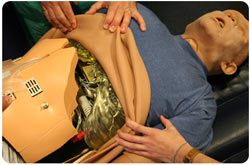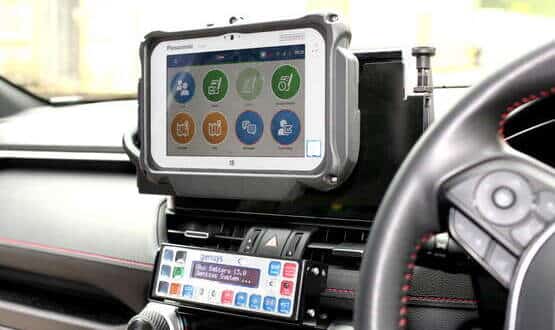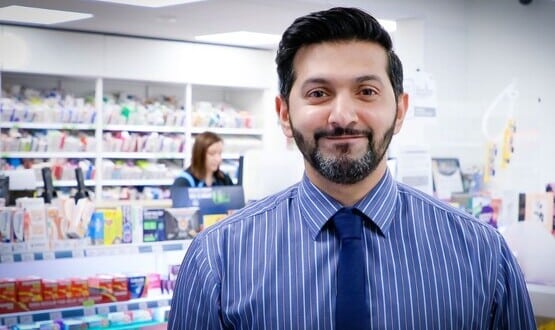Wireless mannequin helps train health professionals
- 21 July 2008
 |
| Inside the iStan mannequin |
Healthcare students at the University of Portsmouth are to use a new wireless, portable mannequin which can be remote-controlled to talk, sweat, bleed, vomit and have a heart attack, for their clinical training from September.
The mannequin, named iStan, is described by its developers, METI in America, as the world’s first wireless patient simulator. University of Portsmouth will be the first in England to use the technology.
Named Stan after ‘standard man’, the mannequin was designed from the inside out so his anatomical structure closely mimics a human skeleton. Its spine, neck, arms and hips all mimic the movement of a real person. It can be male or female, young or old and can be healthy one day and dying the next.
iStan was modelled using a cast of a real person and comes with a range of preconfigured patient profiles and scenarios which lecturers can add to in order to suit their own training needs.
He will be used to train healthcare professionals along with five other simulators ‘living’ and ‘dying’ at the university’s expert centre.
Director of the expert centre, Professor Lesley-Jane Eales-Reynolds, told E-Health Insider: “One of the key advantages of iStan is his portability. As part of the NHS Education South Central group, this means that we can use iStan as a clinical simulation training and refresher tool across the strategic health authority, ensuring continuous learning for health professionals in NHS South Central.
“Paramedic students can test him in a crashed car or collapsed at the foot of some stairs, which is precisely the sort of situation they are likely to encounter in the real world. He can have a cardiac arrest or an adverse drug reaction in a dental chair allowing staff and students in dentistry to practise skills that they could not keep honed using their patients.”
The mannequin is entirely wireless and unfettered so can be placed in someone’s home, an ambulance or a doctor’s waiting room as well as in the classroom; and is equipped with a fully articulated spine, neck, arms and hips; blood and body fluids .
iStan will be joining the university’s family of simulators, including a human patient simulator with anaesthetic and drug-recognition capabilities, an emergency care simulator, two other adults and one child.
It will be stored in the university’s hospital ward and operating theatre to help students practise and gain confidence in their professional skills, as well as students and staff on refresher courses.
Professor Eales-Reynolds added: “The mannequins provide our students with opportunities they have never had before. They can learn their basic skills in the usual way on plastic models but as they become more competent they can then apply those skills in a situation designed to mimic the real world.”
The university will also have access to an online 32-page recipe book for lecturers to create realistic vomit, urine with infection, blood clots, pus, the fruity breath of someone with a specific diabetic condition and a host of other bodily fluids and conditions.
Phil Ashwell, a healthcare professional who teaches at the university, said: “It is very exciting, it’s a whole new world of learning. The mannequins suspend disbelief and bring healthcare to life which means the quality of casualty care will improve. The mannequins promote better, more efficient teamwork and care, which are both vital in the healthcare industry.”
Link




